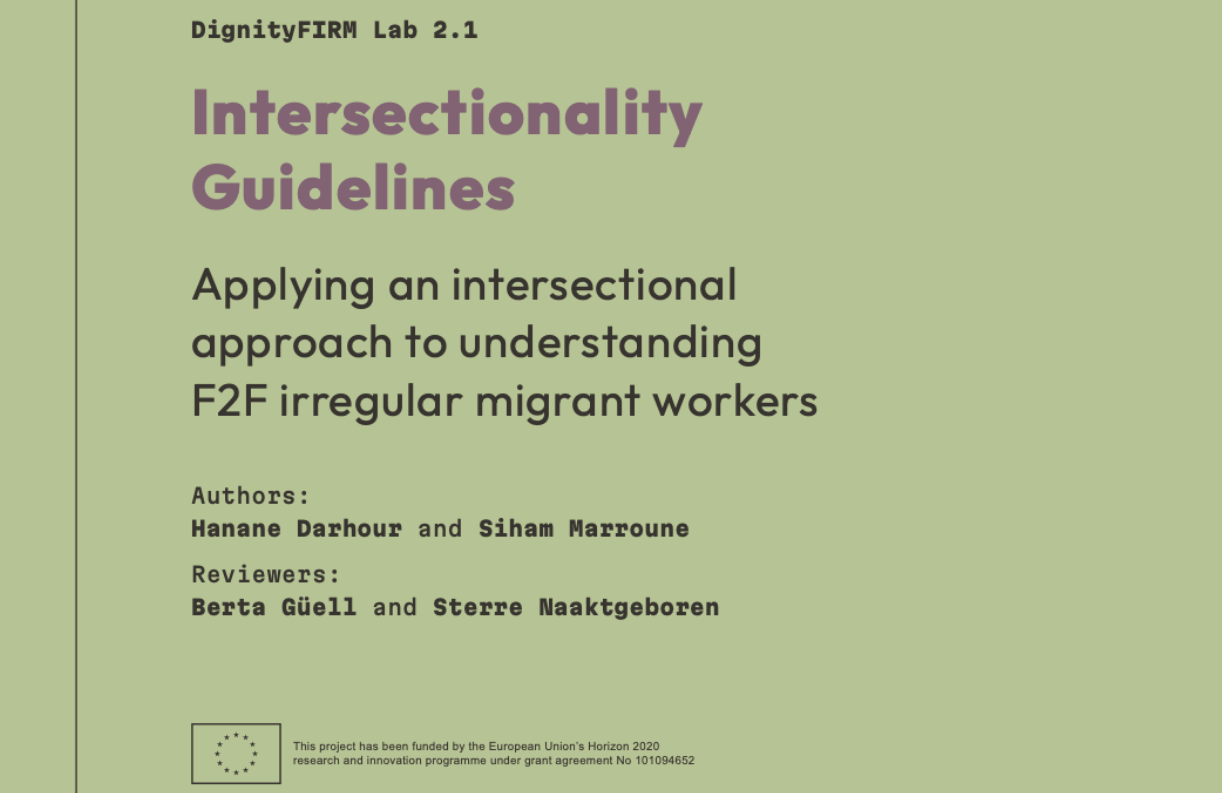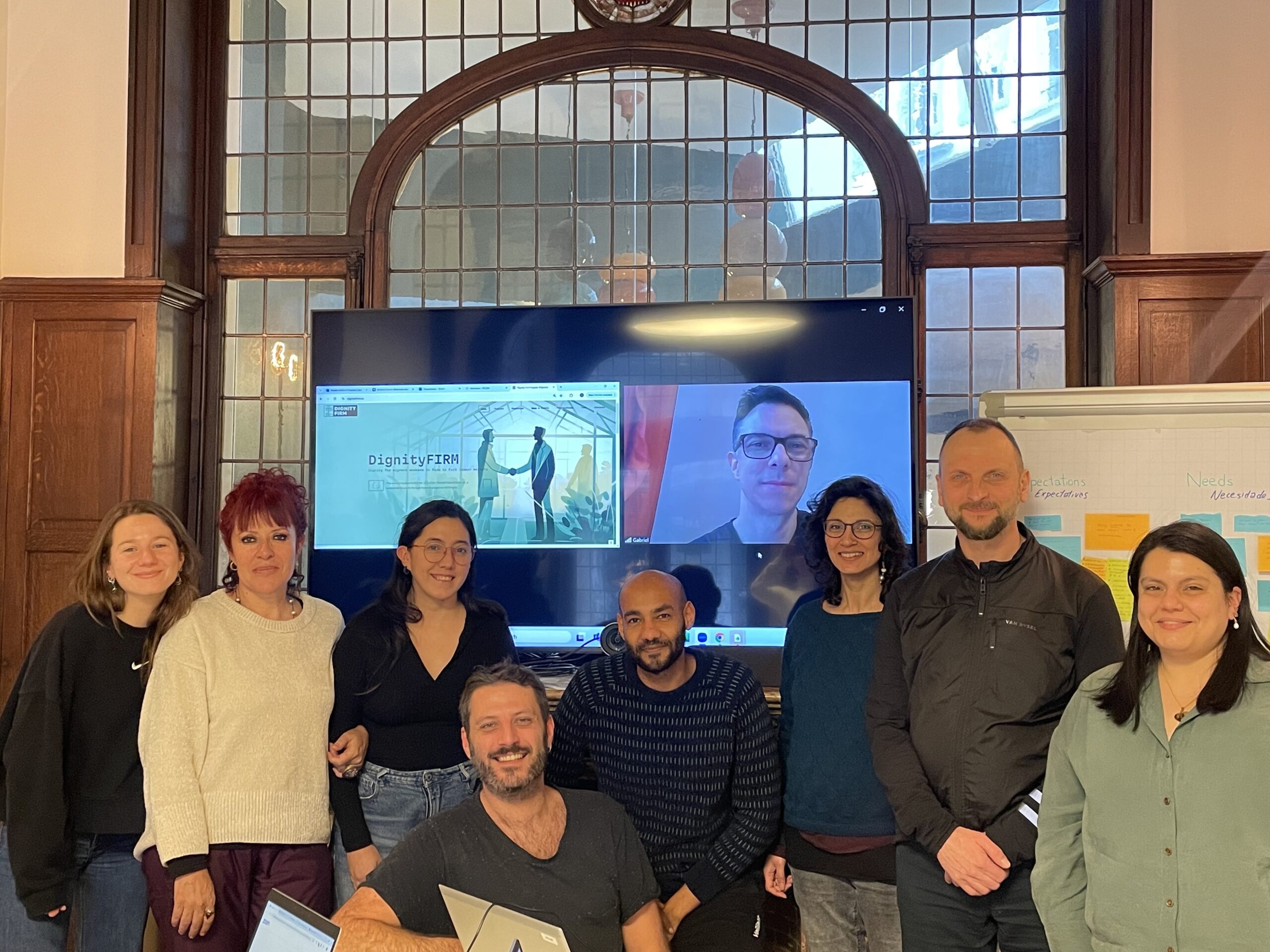
29 May Incorporating Intersectional Analysis into Research on (F2F) Irregular Migrant Workers
Incorporating Intersectional Analysis into Research on (F2F) Irregular Migrant Workers
By: Dr. Siham Marroune, Ibn Zohr University
The purpose behind these comprehensive intersectionality guidelines is to establish a unified conceptual framework and foundation for empirical research of the Dignity-Firm Project on the intersecting inequalities not only in terms of labour conditions and those inequalities embedded in regulatory infrastructure, but also in terms of access to social and health services among “irregular migrant workers” (IMWs) who are involved in the food supply chains in four EU states (Italy, the Netherlands, Poland, Spain) and two associated countries (Morocco and Ukraine). The focus is directed to four farm to fork (F2F) sectors with different dynamics and traits: agriculture, food processing, hospitality, and food delivery. The guidelines offer meticulous details about the approach of intersectionality combining the theoretical and methodological sections to investigate how intersectionality can be incorporated in the research design of each work package (WP). The main premise here is that policies informed by an intersectional perspective are more likely to address the root causes of exploitation and marginalization, leading to more sustainable and just outcomes for all involved.
Intersectionality is an intriguing concept that plays a significant role in the realm of research, particularly in understanding complex social issues. This approach is highly relevant because it acknowledges that identities such as race, ethnicity, gender, class, and nationality do not exist in isolation but rather influence each other in intricate ways. In the context of the food supply chain, intersectionality quests for an examination of the way factors like race, gender, class, ethnicity, and legal status affect irregular migrant workers’ access to resources, opportunities, and power within the system. For instance, women of colour often face unique challenges compared to white men in the agriculture sector, such as limited access to land ownership, financial resources, and markets.
Intersectionality is an epistemology of situated and partial knowledge that keeps up a transversal openness and dialogical approach to all academic disciplines. It provides an analytical tool that looks into the intersections between agri-food workers’ administrative and legal status and other power differentials based on gender, race, class, ethnicity, geopolitical positioning, age, disability, etc. Intersectionality is the best fit to address and leaf through the various systems at play because of its ability to understand “social locations on the margins, borders, and boundaries of identity categories”(1).
The different variables and categories that shape human migration necessitates the use of intersectionality to come to grips with the multiple complexities of migration alongside its constitutive processes. The implementation of intersectionality in migration studies unpacks and enriches our understanding of how migrants experience multiple challenges such as social inequities, injustice and oppression. It helps visualize the interdependency between the characteristic forms of oppression in migration processes revealing how identities intersect to grant advantages for some while preventing others. This is very true when applying intersectionality to understand irregular migrant labour.
Migrants, in particular, are able to disrupt borders and transcend boundaries in various ways, which make them ideal subjects for intersectional analysis (2). Yet, the concept of intersectionality suggests an obvious disagreement between no less than three possible uses. First, intersectionality serves to delineate the extent to which various categories have the capacity to effect gender relations admitting the latter as being always classed and racialized. Second, it is used to discern a conceivable interaction of any social category without even the interference of gender or race as potential aspects. The third use requires the explicit contribution to social justice through the investigation of the intersection of dissimilar categories of disadvantage (3) in straight relation with the praxis world.
By adopting an intersectional lens, stakeholders in the food supply chain can better understand and address the complex dynamics at play. The approach of intersectionality prompts us to consider the way policies, practices, and interventions may disproportionately benefit or harm certain groups based on their intersecting identities. It highlights the significance of combining the experiences and voices of marginalized communities in decision making processes, prioritizing their well-being in policy discussions and implementations. Informed by a diverse range of perspectives and realities, this approach ensures that quick fix results solutions are more equitable and effective. Hence, intersectionality is a powerful framework for identifying and dismantling systemic inequalities for a more just, inclusive, and sustainable food system for all.
Furthermore, examining agency among irregular migrant workers (IMW) within the food supply chain through an intersectional lens illuminates the multifaceted dynamics at play. Despite facing systemic barriers and precarious conditions, irregular migrant workers demonstrate agency by making strategic choices to survive and thrive within the context of their circumstances. Such agency manifests in various forms, from negotiating wages and working conditions to seeking alternative employment opportunities or engaging in collective action for better rights and protections. Noteworthy, agency operates within a restricted context moulded by hierarchical system and intersecting forms of oppression. Intersectional analysis discloses the way axes of identity such as gender, race, class, legal status intersects to shape the extent and limitations of agency faced by irregular migrant workers in the food supply chain paving the way for policy interventions.
Challenges in developing Dignity-Firm Intersectionality guidelines include difficulties with the terminology surrounding “irregularity” and the integration of pertinent questions to monitor various work packages in the methodological section of the guidelines. The term “irregularity” presents complexities in defining the legal status and rights of migrant workers, which impacts the accuracy and inclusivity of the analysis. Moreover, incorporating relevant questions to effectively capture the diverse experiences and vulnerabilities of these workers across different facets of the food supply chain requires careful consideration. By addressing these challenges, these guidelines that are part and parcel of the Dignity-Firm project strive to enhance the comprehensiveness and applicability of intersectionality, ensuring it offers valuable insights and guidance for stakeholders longing for fostering equity and justice within the food industry.
(1) Patricia Hill Collins and Sirma Bilge. 2016. Malden, MA: Polity Press, 224pp.
(2) Bastia, Tanja. (2014). “Intersectionality, Migration and Development.” Progress in Development Studies 14 (3): 237–248. doi:10.1177/1464993414521330.
(3) Bastia, Tanja. (2019). Gender, Migration and Social Transformation: Intersectionality in Bolivian Itinerant Migrations. London: Routledge
Siham Marroune is a University Lecturer at the Faculty of Languages, Arts, and Humanities at Ibn Zohr University. She earned her PhD in Literary and Cultural Studies from Sidi Mohamed Ben Abdellah University in Fez. Her major areas of interest include Cultural and Gender Studies, Migration, and Memory Studies. She has published several articles on topics such as female mobility and agency, body and phenomenology, and modernity and consumerism. She is a member of the Research CLAS Lab, specifically within the research structure focused on Migration, Health, and Social Work. Additionally, she has contributed as a translator and editor to the volume on Human and Environmental Security in the Era of Global Risks, published by Springer.
Cover. Photo by Sebastian Klein via Unsplash
Latest News
- “From Being Studied to Leading Change”. Participatory Action Research as a Transformative Political Tool
- Morocco-EU Relations: What’s at Stake for Farm to Fork Workers? Social Transformations and Food Security
- Examining migration and work precarity: what is the added value (and potential downside) of a public health perspective?
- The UIZ (Université Ibn Zohr) team met the socialist group at the parliament in Morocco
- First DignityFIRM documentary: Mamadou Kouassi Pli Adama, the struggle of migration


